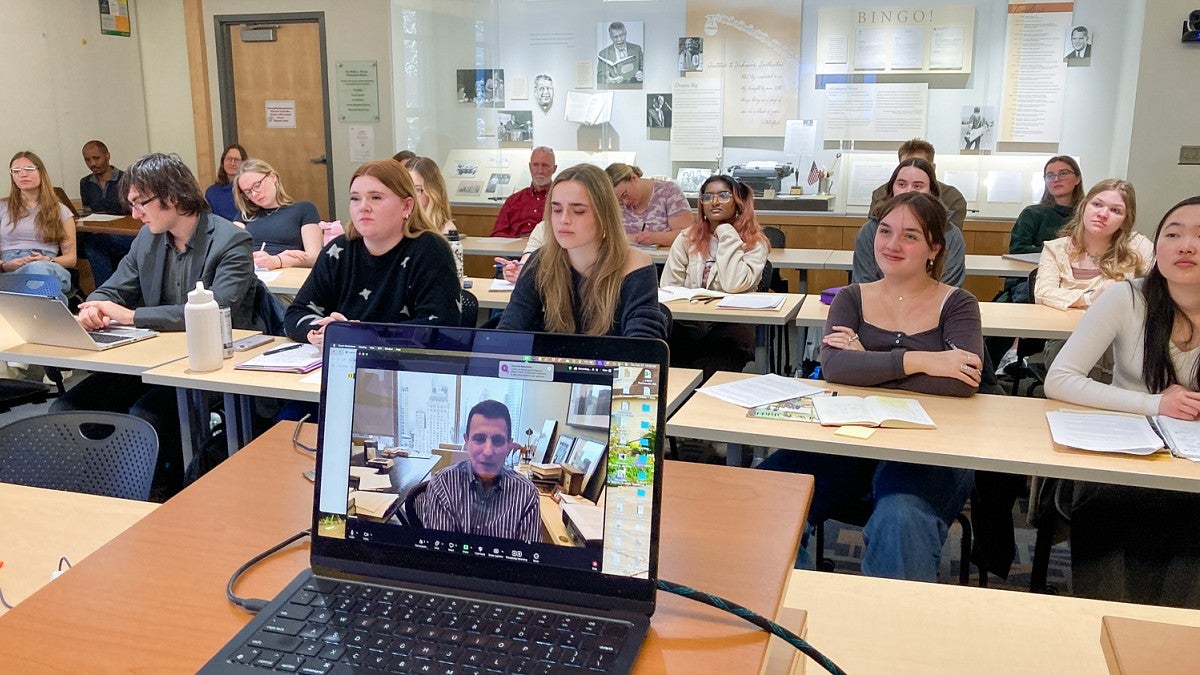
by Seira Kitagawa, Class of ’26
As The New Yorker marked its 100th anniversary this year, I was lucky to be one of 20 students from the UO School of Journalism and Communication (SOJC) Honors Program who celebrated the milestone by talking with the magazine’s renowned editor David Remnick.
Remnick spoke via Zoom to our SOJC honors class “The New Yorker,” which Professor of Practice Charlie Butler created and taught winter term. The class introduced students like me to the magazine and many of its well-known writers and editors, whom Butler invited in as guest speakers.
Before walking into the classroom, I had no idea what The New Yorker was all about and assumed it was a magazine covering happenings in New York City. But I soon learned it was so much more, thanks to Butler, who lived in New York City for a while and is a big fan of the magazine. Imagine a professor teaching about something that he is very passionate about. That’s Butler.
Butler invited writers, cartoonists, the cartoon editor and Remnick to talk to us about what they do. Although I was unfamiliar with these journalists before I took the class, after reading some pieces and flipping through the magazine, I realized that The New Yorker is very serious and polished. It has more than 20 fact-checkers!
Here are three things I would love to share from our time with David Remnick:
Do not avoid the news.
Many of us are very stressed out about the news these days, and some are even depressed about it. It’s a natural tendency to avoid reading, watching or even talking about the news if it’s upsetting. But news avoidance is not the answer, Remnick said. He told us it is better to stay up on the news than to avoid it completely. This advice is not only for journalism students but for all people.
When Remnick takes subways, he occasionally sees people reading The New Yorker, but the majority are scrolling on their phones or watching videos. The internet made it easier to consume information, but it has also caused people to be more distracted and less discerning about news sources.
This reminded me of the important role of journalists in informing and educating people, and journalists can’t do that if people do not consume trusted news media.
It’s OK to fail.
Remnick won a Pulitzer Prize in 1994 for his book “Lenin's Tomb: The Last Days of the Soviet Empire,” which is a huge accomplishment for a journalist. As I spent about an hour talking with him, I could tell that he is a very smart person with rich knowledge and experience. But he also listened to students and showed us that he was curious about what we had to say.
He also emphasized that it’s OK to make mistakes. Hearing these words from Remnick inspired me. I often make mistakes, but Remnick reminded me that it is more important to learn from them than to dwell on them.
We need accurate and fair journalism more than ever.
Many students, professors and journalists in the field have anxiety or fear about the actions of the new federal administration, which has labeled the media “the enemy of the people.”
Remnick was stoic about his role in investigating and reporting the news despite the potential perils. “It is my job,” he said. “I don’t have the choice of not doing it.”
His insights about being a journalist in difficult times inspired me to remember the purpose of what we do. As a journalism major, “accurate and fair” is a fundamental value for me as I continue on this journey.
I invite you to visit the New Yorker website as it marks its 100th anniversary. Even if you aren’t typically a magazine reader, I bet you’ll enjoy The New Yorker for its richness. It offers more than information and insightful commentary. It has humor, fiction and poetry, and a broad range of news stories. You might enjoy the cartoons across the magazine as well.
Seira Kitagawa is a third-year student majoring in journalism and minoring in global studies, and a member of the Clark Honors College. She’s a bilingual storyteller who loves to share about her community as an arts and culture writer for The Daily Emerald.
